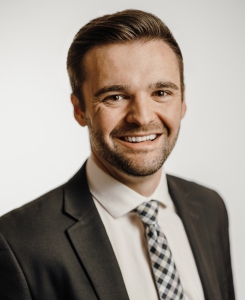Campaign Feasibility Study: What to Expect

By Jake Muszynski, Head of Consulting & Principal, Midwest
Is your organization considering a major fundraising effort and wondering if a campaign feasibility study will be a good first step? A feasibility study is essential to gaining the sort of rich input needed to launch a successful campaign. Studies also help determine if the timing is best for your organization and community, if the right staff is in place, whether leadership is ready, and how well your campaign vision resonates with your prospects.
At Creative Fundraising Advisors (CFA), we include campaign readiness in our campaign feasibility studies to allow us to combine the art and science of fundraising. Campaign readiness and feasibility studies are designed to remove assumptions – to move things from the “we think we know” column into the “we know” column. The only way we can comprehensively do this is by conducting an internal analysis of the organization while also testing assumptions externally.
Why is the readiness part essential? We believe it’s imperative for your leadership to have a full picture of the community’s perception and also whether the staff is ready to take on a campaign. After all, committing your people and organizational reputation to a dedicated, multi-year fundraising effort is a big deal and takes a lot of energy, know-how, and determination.
Depending on what we find during the capital campaign feasibility study process, it’s possible we could recommend your organization pause before launching a campaign because part of your campaign vision needs reworking or we’ve identified a gap in key staffing. On the other hand, the study could help us discover strengths or a great idea that gives your organization a runway to move forward with a higher goal than planned.
Whether it’s feasible to reach your proposed goal or not, the best outcome will be to set your nonprofit up for success. You do this when you connect donor passions with your mission and goals, ultimately creating a positive impact in the communities you serve.
Readiness and Feasibility Go Hand in Hand
Let me explain a bit more about why the readiness and feasibility combination is important. At CFA, we embrace data as an internal tool upon which to build strategies to cultivate and solicit prospective donors. Data gives us capacity information and philanthropic histories about your prospects. We can make more complete recommendations by utilizing data. But data also has limitations, which is why conversations with your constituents—the external inputs—are key. Face-to-face conversations can help us determine insights and nuances that data could never uncover.
Speaking of conversations, we take our comprehensive assessments to the next level externally by conducting community listening sessions and focus groups. By doing more than a limited set of interviews with your top donors, we conduct a more equitable, community-centric view where large financial supporters aren’t the only voices included in the decision-making process.
Our Campaign Readiness and Feasibility Study Process
- Study Oversight Committee – before we kick off the project, we will ask you to form a group to oversee our work throughout the process and take the first look at our recommendations before we present them to your Board.
- Internal Readiness Assessment – to measure if your development function is prepared for the effort you wish to undertake, we audit your development systems, interview staff and board members, determine if the ideal skill sets are in place for a campaign, and review your development committee’s ability to meaningfully assist with fundraising.
- Wealth and Philanthropic Data Screening – we combine your donor data with additional proprietary data to create a potential campaign yield analysis, a recommendation on staffing, and the sizes of gifts needed to achieve that yield. The new data is, of course, for your organization to keep.
- Community Listening Sessions – In some cases, before interviews and focus groups begin, it’s a good idea for us to gather a varied group of supporters and community partners in informal, virtual groups to learn what people think about your nonprofit’s impact and get the widest possible view of perceptions from a diverse cohort of community members.
- The Case for Support – We believe that donors don’t give to what you do, they give to why you do it. In advance of interviews and focus groups, we help you develop a summary of the Case for Support. This draft document expresses the campaign’s “big idea” and priorities and suggests a campaign goal. It is designed to stimulate discussion with your prospects about the organization’s plans for the proposed campaign.
- Conversations with prospects – This is the traditional step that most people think of when they think of a capital campaign feasibility study. During this phase, we engage dozens of your prospects in meaningful, one-on-one conversations around topics most likely to have the greatest bearing on your future success. We set out to gauge prospect enthusiasm, factors that will influence gift timing and size, interest in naming opportunities, and suggestions for campaign leadership. Consider these conversations as a part of your donor cultivation process; sharing the magnitude of the campaign goal and testing their gift potential helps prepare people to be solicited.
- Focus Groups – We believe campaigns should be viewed through the lens of various stakeholders: those who can provide transformational gifts, as well as supporters who may have less capacity or a different, but equally as important, viewpoint. Focus groups are a powerful way to determine the motivations of a broader set of people. Each focus group discusses what they value about the organization and what they think about the proposed campaign. These meetings signal to participants that the institution is interested in their opinion and serious about fundraising.
- Final Report – Our Campaign Readiness and Feasibility Study Reports cover a range of insights, including topline impressions of your organization and the proposed campaign, discussion of the most likely and most significant financial gifts uncovered along with a working campaign goal, recommendations for how to position the Case for Support and organize your leadership, and a suggested timeline, budget, and next steps for internal campaign planning.
One example of an organization transformed by a campaign readiness and feasibility study is our client Dodge Nature Center. When we began our work with them, they hoped to raise $15 million to double their endowment. The study set the stage for a $40 million comprehensive campaign. After listening to Dodge Nature Center’s most committed donors, Board members, and staff, together we realized they could and should expand their vision and goal. Read more about the Dodge Nature Center campaign success story.
Contact Us
CFA’s rigorous campaign readiness and feasibility study process can help you find the right path to secure your organization’s future and have a deeper impact. If you are interested in learning more about our services, contact CFA today.

Jake Muszynski, Head of Consulting & Principal, Midwest
Jake is a highly experienced fundraising and consulting professional with over 15 years of combined experience in the industry. He began his successful career in major gifts at higher education institutions and has since provided counsel to over 30 clients at CFA, where he currently serves as Principal.
In this role, Jake leads major projects across the United States, including campaign readiness and feasibility studies, campaign planning and counsel, and development assessments. He takes a holistic approach to fundraising, considering organizational health from all perspectives and applying a mix of soft skills and data-driven decision-making to each unique situation.
A native of Perham, Minnesota, Jake holds a bachelor’s degree in communication from Concordia College. He and his wife have two children and share a love of folk and jazz music.
